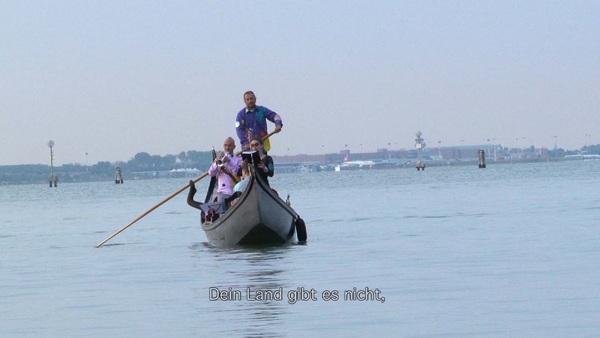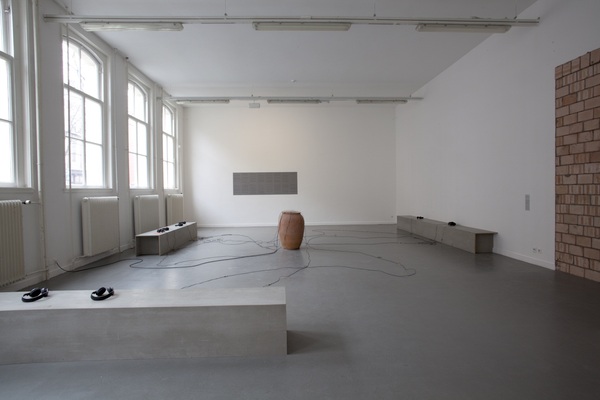Spanish-born artist Libia Castro and Icelandic-born Ólafur Ólafsson investigate the subjects of universal injustice, inequality, and power relations employing a variety of media in their quest to highlight imbalances in present-day political, social and economic realities. Asymmetry at TENT Rotterdam is the Rotterdam Berlin-based duo’s first retrospective in the Netherlands. Curated by Adam Budak, the show features work spanning a ten-year work period including video installations, sound and sculptural pieces, photographs, and objects.
In the hands of Castro and Ólafsson the revealed history of inequality begins in ancient times. Revisiting drama texts by Ancient Greek authors, the artists comment on the legacy of xenophobic and sexist views inherited in legal systems. Women and foreigners were denied rights to citizenship in the Athenian polis. Under Greek law citizens were also prohibited from marrying and having intimate encounters with foreigners for fear of introducing racial impurities. Exorcising Ancient Ghosts (2010-11) is a sound installation, which features two couples citing texts in Italian and English while having sex. The pairs are of mixed origin. The contemporary reading of these injustices against different people within a community has been taken quite literally.

Libia Castro & Ólafur Ólafsson, Il Tuo Paese Non Esiste (Your Country Doesn't Exist), 2011; Courtesy of the artist and TENT Rotterdam.
Castro and Ólafsson are well known for their campaign-based works, a number of which are shown at TENT, including the videos Caregivers, Lobbyists, and Il Tuo Paese Non Esiste (Your Country Does not Exist). The three works are powerfully displayed on big screens with specifically composed musical accompaniments played over an amplified sound system. Contrary to the humoristic approach employed in the former two, the later work, Caregivers, is rather upsetting documentation of the labor force movements within continental Europe. Nowadays more and more workers are looking for opportunities in other countries, with some finding their way to the homes of handicapped and elderly people. The video depicts the relationship between immigrant-caregivers from Eastern European countries with their patients, particularly commenting on the historical concentration of female labor in the Rovereto region in Italy. Il Tuo Paese Non Esiste, on the other hand, is an ironic operetta performed by a soprano and two musicians on a gondola ride through Venetian canals. The professional singer and musicians play quotes from texts about the work. The artists satirically reflect on issues of national belonging or non-belonging and the collapse of the nation-state. The project has taken different forms including presentation on billboards, neon signs, and advertisements in various countries such as the Netherlands, Austria, Italy and Bosnia-Herzegovina. National pride is reduced to a mere slogan, which questions the modern state in a multicultural and global world.
In most works the artists intertwine humor and irony with the highest degree of seriousness. In the video-work Lobbyists, which received the third prize in the Dutch Prix de Rome competition in 2009, a reggae singer narrates the story of powerful groups active in the grey domain of European Union policy making. The film presents these decision-makers grotesquely in their natural surroundings and there is a kind of contradiction between the subject matter’s sincerity and the reggae vibes and lyrics used to narrate the story.

Libia Castro & Ólafur Ólafsson, Asymmetry installation view;Courtesy of the artist and TENT Rotterdam/ foto Job Janssen & Jan Adriaan.
Castro and Ólafsson’s work is based on meticulous research where central questions remain as to who has ThE riGHt tO RighT and ThE riGHt tO WrOnG. In 2012, on occasion of the 7th Liverpool Biennale, the artists displayed a big neon sign with which they wanted to question fundamental and universal human rights. In collaboration with British writer and philosopher Nina Power, they designed the Partial Declaration of Human Wrongs. A free newspaper introduces the visitors to the pillars of their manifesto. The constitution revises basic rights, substituting the right with the wrong. What appears to be rightful is rewritten as a non-given right, as in Article 23: Everyone has the right to work, to free choice of employment, to just and favourable conditions of work and to protection against unemployment. (Note: there are no jobs.)
(Image on top: Libia Castro & Ólafur Ólafsson, Asymmetry installation view;Courtesy of the artist and TENT Rotterdam/ foto Job Janssen & Jan Adriaans.)